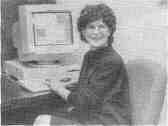We always get the
government we deserve
by Peggy Boyer Long
On August 21, 1858, between 10,000 and 20,000 people flocked to Ottawa
just to listen to two men who were running for the U.S. Senate. Democratic
incumbent Stephen A. Douglas and his
Republican challenger, Abraham Lincoln, traveled to that Illinois River town
to launch the first of seven debates on
the subject of slavery.
Historian Harold Holzer describes
those campaign events in his 1993
book, The Lincoln-Douglas Debates.
His theme is that the speeches transformed voters' views on the issue.
What's striking, though, is how many
people were willing to turn out.
"No one," Holzer writes, "was prepared for the crush of humanity" in
Ottawa. Citizens "flooded in on foot,
on horseback, in ox-drawn wagons, in
fancy carriages, and aboard huge canal
boats emblazoned with political banners. A fourteen-car special train
hauled in spectators at half fare from
Chicago, while eleven extra cars
brought another crowd from Peru and
La Salle." Such scenes were repeated in
other Illinois towns throughout that
summer and fall, according to Holzer.
In September, 12,000 to 15,000 spectators showed up in Charleston, some
from neighboring Indiana. In Galesburg that October, another 15,000 to
20,000 braved bad weather.
Flash forward to today's elections,
when many citizens have difficulty lifting the channel-changer for televised
debates or navigating the few blocks to
the polls. An alarming new survey by
The Washington Post, the Kaiser Family Foundation and Harvard University
finds that many have become disinterested in politics, uninformed about government and misinformed about issues.
Washington Post writer Richard
Morin reports that of 1,514 people surveyed, four in 10 could not name the
vice president; three out of four were
unaware that U.S. senators are elected
for six-year terms; and two-thirds could
not name their U.S. representative. The
survey also found that voters are woefully misinformed about policy debates.
The excuse? Were too busy to follow
the news in any depth. But such laziness
and ignorance carries a cost, according
to Morin's analysis. To the extent that
they vote at all, the ill-informed among
us are more likely to vote against their
own stated interests — lending special
poignancy to the old saw that we always
get the government we deserve.
Voters in the mid-19th century were
asked to grapple with an idea that
shaped who we are as a people. Our
task is not so grave. Yet today we are
engaged in a debate on the scope and
responsibility of our central government, a debate that could affect programs and policies for decades to come.
We hope this issue helps you prepare
for the March 19 primary. To that end,
we've examined key races. And we've
identified additional sources of information. Read up. Then go vote. *
4 * March 1996 Illinois Issues



